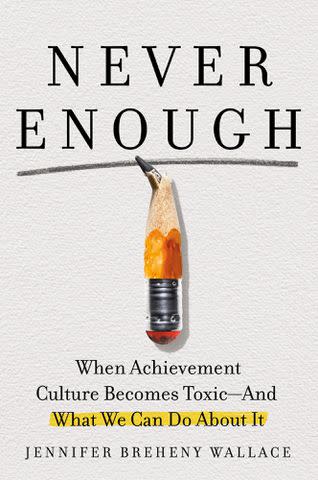It’s Time to Let Go of Toxic Achievement Culture, Says New Book, 'Never Enough'
After the Varsity Blues college admissions scandal, Jennifer Breheny Wallace knew it was time to rethink how hard we push our children to succeed
For Jennifer Breheny Wallace, 2019 was the year three big things happened:
First, her oldest child was poised to begin high school. Then, it was the year of the Varsity Blues scandal, in which parents, including stars such as Lori Loughlin and Felicity Huffman, were tried and convicted of conspiring to fraudulently win their children admission to some of America’s top-rated universities. And finally, 2019 was when Wallace, a journalist and mother of three, was researching a newspaper story and found that two national policy reports warned that children attending “high-achievement schools” were disproportionately at risk for anxiety, depression and substance use disorder.
“My kids go to these competitive schools,” Wallace said, “and I wanted to know what I could do in my own home to buffer against the excessive pressure that these researchers were finding.”
Powered by curiosity and concern, Wallace took that question and ran with it. The result is her new book, Never Enough: When Achievement Cultures Becomes Toxic and What We Can Do About It. She talked with PEOPLE about what she learned while writing it.
Even before you began your research, were you noticing the kinds of stress and burnout in the parents and children you know?
Yes, I saw it all around me. I really saw it at my college's 25th reunion, where there were parents from [all] around the country. We hadn't seen each other in 25 years, and yet the stories were all the same, talking about how busy their children's lives were, how weekends were fractured with travel sports, and how their kids were suffering from crippling levels of anxiety around this achievement pressure in a way that was very unfamiliar to us when we were growing up. So this is an issue that, as I found in my research, affects every state.

Courtesy of Portfolio/Penguin Random House
Wallace's book analyzes toxic achievement culture and how it affects both children and parentsAs you mention, you didn’t grow up like that. Yet sometimes it feels as if everyone is raising their kids this way. What happened? What changed?
Yeah, exactly. I wanted to know that, too. So I interviewed historians and economists and sociologists, and the cause that really resonated with me was that back when I was growing up in the seventies and early eighties, life was generally more affordable. Housing was more affordable, healthcare was more affordable, higher education was more affordable, food was more affordable. And so parents could feel assured that even with some setbacks, their children would probably wind up at least as well as [they had] in terms of socioeconomics, if not better. In the United States, we have this idea that every generation should be able to do better than the last. And we're seeing for the first time, a generation of kids who have less wealth, are saddled with higher ed debt and can't afford housing. And whether we're aware of it or not, we are trying to prepare our kids for what we feel, and fear is a very uncertain future. So it's understandable that parents are nervous and we have fewer and fewer social safety nets in this country. And so this is not to blame parents, this is to help parents have some context about the environment they're raising their kids in.
Right. And once it feels like all the other parents are pushing their kids really hard, you feel like you have to also. How can you step off that treadmill?
Yes. So for most of the book, I went in search of healthy strivers. I wanted to know what, if anything they had in common. What did their parents focus on at home? What were their relationships like with their peers? What was school like? And I found about 14 or 15 things that these healthy achievers had in common. And as I was looking for a framework to present my findings, I came across this idea of mattering.
Tell me what that means, exactly.
So mattering is this idea of feeling valued for who you are, deep at your core, away from your accomplishments, away from your resume and your GPA. So these kids I met who were the healthy strivers had this high level of mattering. They felt seen and valued by their family, their friends, and their larger community. And they were depended on to add meaningful value back to their parents, to their families, to their friends, to their larger communities. It created this positive upward spiral that mattering acted like a protective shield that helped to buffer against setbacks.
What these families focused on is that they sent their children very clear messages. They were in these environments, these pressurized environments., And they said to their kids, "You matter, no matter what. You are not your grades. You are not your activities." They put up guardrails so that their kids could only take a certain number of AP classes, even if the school allowed more, the parents put their foot down and said no. When activities were taken, it was not at the expense of family time, downtime, and having some playtime during the day. So these parents that I met were extremely intentional, and it wasn't always easy to be countercultural, but what helped them was they found other families in their community who were like-minded, who would remind them of their values.

Getty
'My kids go to these competitive schools,' Wallace said, 'and I wanted to know what I could do in my own home to buffer against the excessive pressure that these researchers were finding'That can be hard to do, because even the most well-intentioned parents can get really swept up in the anxiety of needing to raise super successful children. How can parents themselves let go of that anxiety?
I asked the same of the researchers that I interviewed. The first step I would say is that they have to take the time to unpack their psychological attics, the messages that they were sent growing up by parents, coaches, teachers about achievement and about how achievement was looked at, whether it was coupled with their worth, and have to get honest about that upbringing. And what I have found in the research is that families that are overly consumed with what researchers call materialistic values, those are people that highly value career goals, material goods, status symbols, those values are linked with poor mental health and substance abuse disorders.
But what I found most surprising when it comes to parents is that the number one intervention for any child in distress is to make sure the primary caregiver's wellbeing and mental health is intact, because a child's resilience, researchers say, rests on a parent's resilience. So as parents, we have been sold a bill of goods that we live in this hyper individualistic culture.
We need to be everything for our kids. We need to be their therapist, we need to be their driver, the short-order cook, the homework helper, all of these things. And this intensive parenting comes at an extreme cost to caregivers.
So to me, one of the major messages in the book is that for our kids to do well, we caregivers have to be doing well. And while parenting has always been about putting a child's needs first, it has never been more intense than it is today.
Related: Teen Stress Is on the Rise: Why It's a Major Problem, and How You Can Help
The book focuses mostly on families who are in these so-called “high achievement” settings. But do the lessons you learned apply to other families more broadly?
Yes, the students I’m writing about generally fall in the top 20-25 percent of household income, so roughly with families who have an income of $130K or more. But the pressures I'm writing about are really ubiquitous. Young people are sent messages from our wider culture that tell them they’re not enough — not smart enough, pretty enough, rich enough. Our kids are internalizing this idea and it’s putting them at risk.

Getty
'I want them to be ambitious for more than just career success or a GPA,' Wallace says of her hopes for high-achieving childrenDo you think we need to come up with a different definition of success? Like, we still want our children to succeed, but how do we define that?
So the way I've come to look at it and describe it to my kids is that I'm ambitious. This is not an anti-achievement, anti-ambition book. What I am telling parents is that it's time to be ambitious for more. It's time to be ambitious for more than just this narrow and narrower definition of success. I want my kids to, yes, I want them to achieve, but I also want them to have amazing friendships. I want them to grow up one day and have successful partnerships with their significant other. I want them to engage in hobbies that bring them joy. So I want them to be ambitious for more than just career success or a GPA. I want to teach our kids how to live a life that matters, a healthy, sustainable, joyful life that includes achievement, but that it is not only defined by achievement.
Never miss a story — sign up for PEOPLE's free daily newsletter to stay up-to-date on the best of what PEOPLE has to offer, from juicy celebrity news to compelling human-interest stories.
For more on raising children who believe they matter, visit Wallace’s website and learn about the Mattering Movement.
This interview has been condensed and edited for clarity.
For more People news, make sure to sign up for our newsletter!
Read the original article on People.


